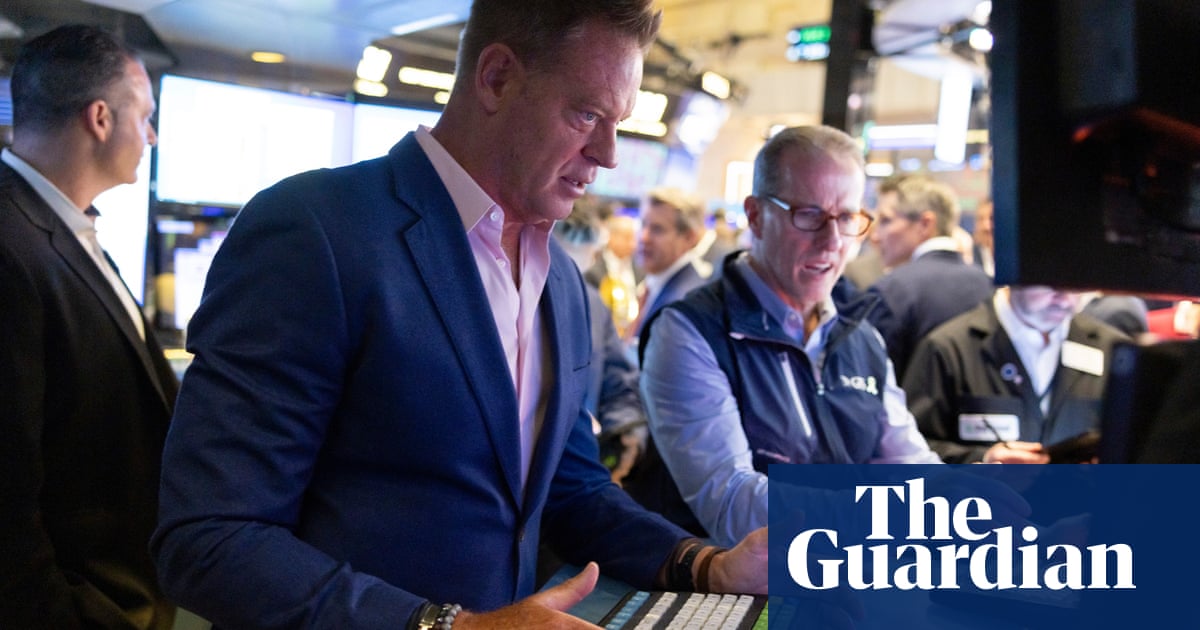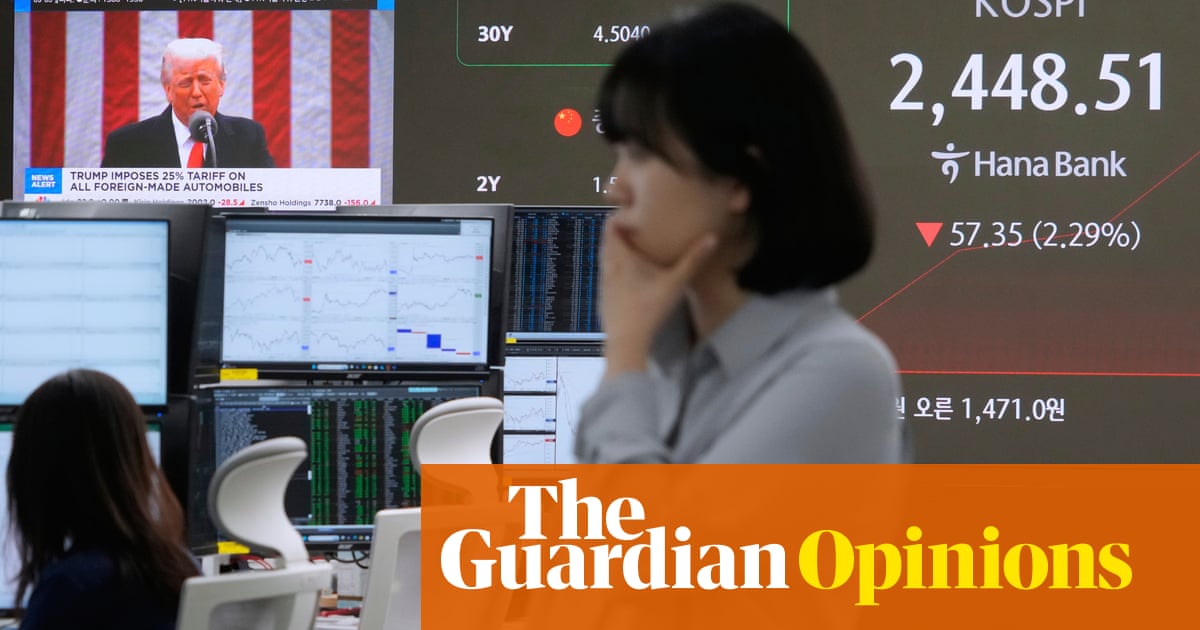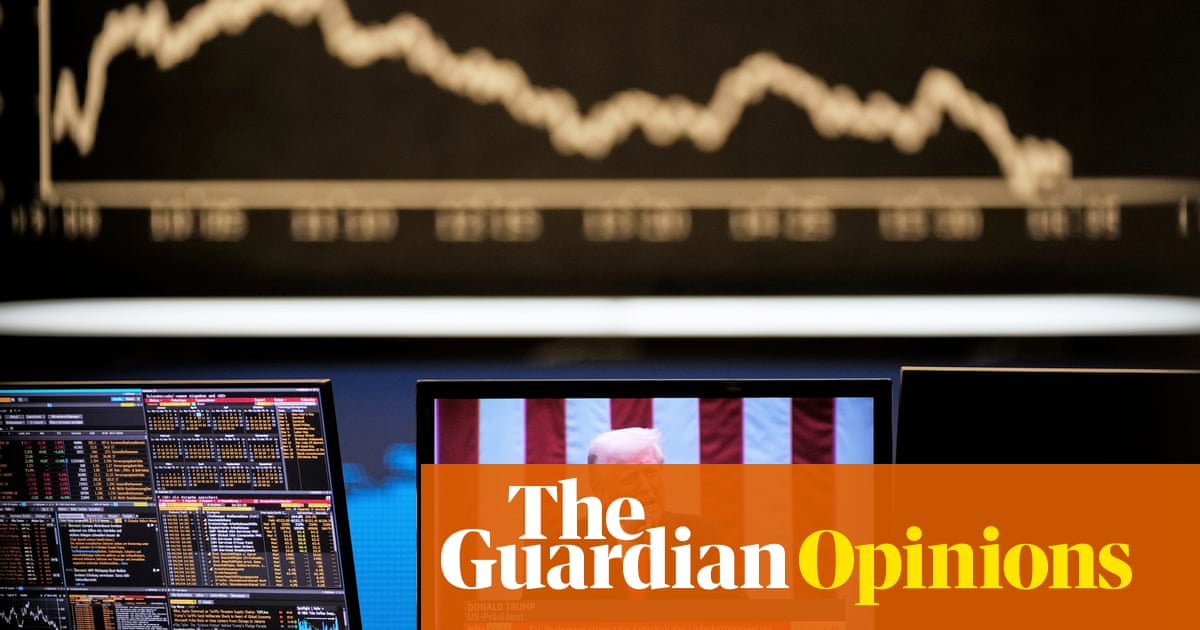Donald Trump hit the UK with tariffs of 10% on exports to the US as he ignited a global trade war that could wipe billions off economic growth.
The US president accused other nations, including allies, of “looting, pillaging, raping and plundering” the US, as he announced tariffs on economic rivals including 20% on the EU and 34% on China.
Downing Street, which had been expecting a 20% rate to be imposed on the UK, will be relieved to have escaped the higher rate, with Keir Starmer’s more conciliatory approach to the Trump administration appearing to have paid off.
UK ministers have ruled out imposing retaliatory barriers while talks on an economic deal with the US continue, and are hoping for further carve-outs for UK companies, which export more than £60bn worth of goods to the US a year.
At a press conference in the White House rose garden, Trump said: “For decades, our country has been looted, pillaged, raped and plundered by nations near and far, both friend and foe alike … our country and its taxpayers have been ripped off for more than 50 years, but it is not going to happen any more.
“This is one of the most important days, in my opinion, in American history. It’s our declaration of economic independence. For years, hard-working American citizens were forced to sit on the sidelines as other nations got rich and powerful, much of it at our expense, but now it’s our turn to prosper.”
Addressing a crowd including his vice-president, JD Vance, the cabinet, White House aides and US workers, Trump added: “This will be, indeed, the golden age of America. It’s coming back, and we’re going to come back very strongly.”
In a watershed announcement for global trade, Trump announced a universal “baseline” 10% tariff on imports into the US, while singling out around a dozen trading partners for higher levies.
Earlier, Starmer had told MPs the government was “prepared for all eventualities” when it came to what Trump is calling “liberation day” and while all options were on the table he would avoid any kneejerk response.
UK officials are understood to have reached broad agreement with US counterparts on a trade deal, focusing on technology but including other sectors, which they hope will eventually reduce tariffs. However, they acknowledge getting a trade deal over the line could take weeks, if not months.
There is also a risk of the UK being flooded by cheap goods from countries such as China as trade is diverted from the US to other markets, and the government is drawing up plans to protect key industries such as pharmaceuticals, cars, food and drink.
“A trade war is in nobody’s interest, and the country deserves, and we will take, a calm, pragmatic approach,” Starmer told MPs at prime minister’s questions.
“That is why constructive talks are progressing to agree a wider economic prosperity deal with the US. That is why we are working with all industries and sectors likely to be impacted.
“Our decision will always be guided by our national interests, and that’s why we have prepared for all eventualities, and we will rule nothing out.”
The prime minister dismissed a suggestion from the Liberal Democrat leader, Ed Davey, that there should be “coalition of the willing” among trade allies to line up against the Trump tariffs, arguing siding with other nations was a “false choice”.
“It is important at moments like this that we don’t have kneejerk reactions, that we are actually cool-headed about this,” he added.
However, Rachel Reeves revealed the UK was in talks with trading partners about how to respond, and had spoken to the European trade commissioner, Valdis Dombrovskis, about the EU’s plans to retaliate with their own tariffs.
The chancellor insisted the UK would not jeopardise the possibility of its own economic deal with the US by “posturing” in response to tariffs.
“We don’t want to be posturing here. The prize on offer is a good economic agreement between us and the United States. We are not going to do anything to put that in jeopardy,” she told the Treasury select committee.
after newsletter promotion
But she warned that the UK would not be “out of the woods” even if it could secure a deal, as the main impact on the British economy would be from global tariffs rather than UK-specific ones, thanks to depressed demand and higher inflation in other countries.
In its economic forecast last week, the Office for Budget Responsibility (OBR) warned that the most “severe” scenario, in which the UK and other nations retaliated to US tariffs, would result in GDP being 0.6% lower than expected this year and 1% lower next year.
This would almost entirely eliminate the chancellor’s £9.9bn headroom under her fiscal rules, potentially forcing her to implement further spending cuts or tax rises this autumn.
An alternative scenario, in which the UK does not retaliate, would mean a smaller reduction in growth, with GDP 0.4% lower than expected this year and 0.6% lower next year.
The US dollar was falling sharply against key currencies on Wednesday evening as Trump delivered his tariffs announcement at the White House. The dollar had dropped about 0.7% against the pound, at 0.768, shortly after the speech began.
The US currency was weakening further against the euro, falling about 1%, at 0.9162. Traders have been reacting to developments from the US amid uncertainty over how global trade will be affected by new tariffs, and how far affected countries will respond.
Trump confirmed a previously announced 25% tariff on cars imported into the US, set to come into effect this week, hitting a UK export market to the US worth £6.4bn, which includes luxury car manufacturers such as Rolls-Royce and Aston Martin.
The US president has already imposed 25% tariffs on steel and aluminium imports, and industry bosses have warned that customers were already looking for alternative suppliers and in some cases cancelling orders.
The White House’s tariff wars also risk reopening simmering Brexit tensions in Northern Ireland, which has continued to apply EU customs laws since Brexit, meaning splits between London and Brussels over the response to US tariffs could drive a wedge between the nation and the rest of the UK.
EU retaliatory tariffs on US imports would need to be paid by Northern Irish importers, even if Starmer secured a carve-out for the UK or chose not to immediately respond. Businesses can claim back the tax through a reimbursement scheme but trade experts said the issue could reopen old political sores.
Since taking office, Trump has rattled global stock markets and caused consternation among business leaders by announcing and then delaying plans to impose tariffs on foreign imports, including from Canada and Mexico. The US has also brought in rounds of tariff hikes on China.
The threats have soured relations between the US and its largest trading partners. Canada’s prime minister, Mark Carney, has called them “unjustified” and said his country would react robustly. The EU has said it has a “strong plan” to retaliate.

 23 hours ago
9
23 hours ago
9













































